By Robert St. Martin
 Los Angeles, CA (The Hollywood Times) 6/22/23 – HBO Original documentary film THE STROLL, directed by Kristen Lovell and Zackary Drucker debuted Wednesday, June 21 (9:00 pm ET/PT) on HBO and will be available to stream on Max coinciding with LGBTQ Pride Month. The Stroll (2023), the documentary directed by Zachary Drucker & Kristen Lovell and winner of the Special Jury Documentary Award at Sundance 2023, was included recently in the Outfest Fusion Festival in Los Angeles. The history of New York’s Meatpacking District around 14th Street is told from the point of view of transgender sex workers who lived and worked there. Filmmaker Kristen Lovell, who walked “the stroll,” reunites her sisters to recount the violence, policing, and gentrification that lead to a movement for transgender rights. The film is a frank celebration of a pre-Giuliani New York and that unique period in New York City history in the 1980s when 14th Street was the turf of trans sex workers. Lovell – an actress, activist, and the producer of the seminal trans film The Garden Left Behind – knows the streets well, and after being the subject of a 2007 documentary about prostitution her eyes were opened to the possibility of one day making a film. In fifteen years, she’s gone from being homeless and sleeping at a Times Square megaplex to debuting her first feature documentary in 2023 that will screen on HBO in June.
Los Angeles, CA (The Hollywood Times) 6/22/23 – HBO Original documentary film THE STROLL, directed by Kristen Lovell and Zackary Drucker debuted Wednesday, June 21 (9:00 pm ET/PT) on HBO and will be available to stream on Max coinciding with LGBTQ Pride Month. The Stroll (2023), the documentary directed by Zachary Drucker & Kristen Lovell and winner of the Special Jury Documentary Award at Sundance 2023, was included recently in the Outfest Fusion Festival in Los Angeles. The history of New York’s Meatpacking District around 14th Street is told from the point of view of transgender sex workers who lived and worked there. Filmmaker Kristen Lovell, who walked “the stroll,” reunites her sisters to recount the violence, policing, and gentrification that lead to a movement for transgender rights. The film is a frank celebration of a pre-Giuliani New York and that unique period in New York City history in the 1980s when 14th Street was the turf of trans sex workers. Lovell – an actress, activist, and the producer of the seminal trans film The Garden Left Behind – knows the streets well, and after being the subject of a 2007 documentary about prostitution her eyes were opened to the possibility of one day making a film. In fifteen years, she’s gone from being homeless and sleeping at a Times Square megaplex to debuting her first feature documentary in 2023 that will screen on HBO in June.
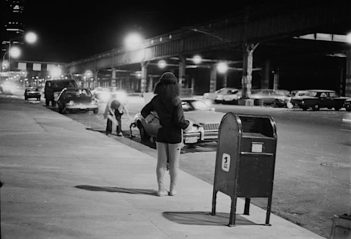 This is a very personal history with those who worked “the stroll.” Or as Lady P puts it: “When you have no opportunities you have to go to ‘the ho show.’” The Stroll evokes HBO Documentary Films’ former bread and butter, the American Undercover series, which featured several documentaries by Brent Owens exploring the world’s oldest profession with titles like Pimps Up, Ho’s Down and Atlantic City Hookers: It’ Ain’t E-Z Being a Ho. The Stroll tries to share a comprehensive view of the story of trans sex workers in New York City’s Meatpacking Street – drawing on interviews with surviving sex workers from that era, archival footage, animation with trans actresses today recreating street scenes, and a visit to the completely gentrified 14th Street of today.
This is a very personal history with those who worked “the stroll.” Or as Lady P puts it: “When you have no opportunities you have to go to ‘the ho show.’” The Stroll evokes HBO Documentary Films’ former bread and butter, the American Undercover series, which featured several documentaries by Brent Owens exploring the world’s oldest profession with titles like Pimps Up, Ho’s Down and Atlantic City Hookers: It’ Ain’t E-Z Being a Ho. The Stroll tries to share a comprehensive view of the story of trans sex workers in New York City’s Meatpacking Street – drawing on interviews with surviving sex workers from that era, archival footage, animation with trans actresses today recreating street scenes, and a visit to the completely gentrified 14th Street of today.
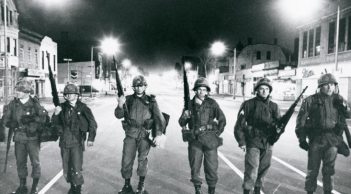 The film does offer a fair portrait of all stakeholders: From the trans youth who often have no choice or job opportunities to residents who, having gentrified the meatpacking district, would rather not wake up to sex acts being performed in front of their houses. The picture also unpacks the history of 14th St in what is now a luxury shopping, dining, and entertainment area along the High Line. The Gansevoort meatpacking district is now home to only seven meat packers, from a high of around two-hundred many years before.
The film does offer a fair portrait of all stakeholders: From the trans youth who often have no choice or job opportunities to residents who, having gentrified the meatpacking district, would rather not wake up to sex acts being performed in front of their houses. The picture also unpacks the history of 14th St in what is now a luxury shopping, dining, and entertainment area along the High Line. The Gansevoort meatpacking district is now home to only seven meat packers, from a high of around two-hundred many years before.
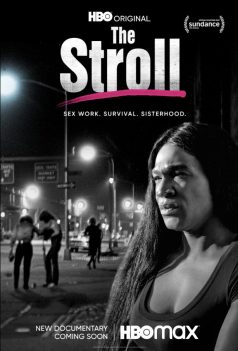 Though this is a sweeping film that employs interviews and archival footage, Lovell (present onscreen) and Drucker (largely offscreen) find the documentation of their history to be an issue, and start uncovering more when they change their search term to include the now out-of-fashion “transvestite” in their inquiries. This leads them to footage captured by a young RuPaul, who conducted playful on-the-street interviews for her 1990s Manhattan Cable TV show, where The Stroll was treated as a curiosity. What is quite powerfully portrayed in the film is the sense of sisterhood that emerged as trans youth found a sense of community in those darker days of homelessness and violence against the trans community.
Though this is a sweeping film that employs interviews and archival footage, Lovell (present onscreen) and Drucker (largely offscreen) find the documentation of their history to be an issue, and start uncovering more when they change their search term to include the now out-of-fashion “transvestite” in their inquiries. This leads them to footage captured by a young RuPaul, who conducted playful on-the-street interviews for her 1990s Manhattan Cable TV show, where The Stroll was treated as a curiosity. What is quite powerfully portrayed in the film is the sense of sisterhood that emerged as trans youth found a sense of community in those darker days of homelessness and violence against the trans community.
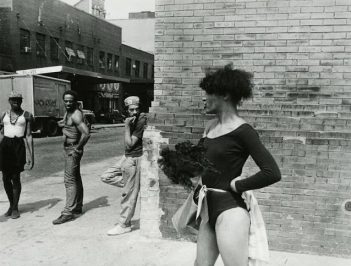 Their lives were not easy. Some note they were safer in the street than with their families, and that traditional jobs were not readily accessible to trans women. Lovell herself was fired from a job during transitioning and began sex work during the 1990s. Besides not being welcome by basic facets of society many take for granted (work, home, family), they also faced constant arrests. As a police siren sounds outside of a window during one of the interviews, the stately former sex worker Egyptt LaBeija says bitterly, “I hope their tires bust.”
Their lives were not easy. Some note they were safer in the street than with their families, and that traditional jobs were not readily accessible to trans women. Lovell herself was fired from a job during transitioning and began sex work during the 1990s. Besides not being welcome by basic facets of society many take for granted (work, home, family), they also faced constant arrests. As a police siren sounds outside of a window during one of the interviews, the stately former sex worker Egyptt LaBeija says bitterly, “I hope their tires bust.”
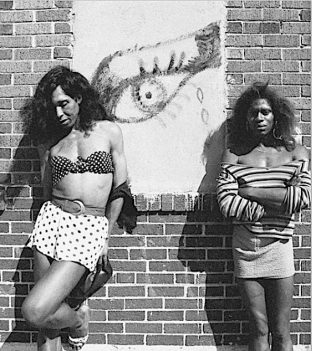 The New York City police of that 6th Precinct were especially brutal with their planned police strikes. With the election of Rudolph Giuliani, the crack-down on trans sex worker began and many were arrested under the “broken windows” policing laws. The gentrification of previously queer-owned spaces in the Meatpacking District were sold after AIDS ravaged the community. Under Mayor Bloomberg, the incarceration of trans sex workers continued more fiercely. And it was Bloomberg’s planned to rebuild the Meatpacking District as the gentrified neighborhood that it has become.
The New York City police of that 6th Precinct were especially brutal with their planned police strikes. With the election of Rudolph Giuliani, the crack-down on trans sex worker began and many were arrested under the “broken windows” policing laws. The gentrification of previously queer-owned spaces in the Meatpacking District were sold after AIDS ravaged the community. Under Mayor Bloomberg, the incarceration of trans sex workers continued more fiercely. And it was Bloomberg’s planned to rebuild the Meatpacking District as the gentrified neighborhood that it has become.
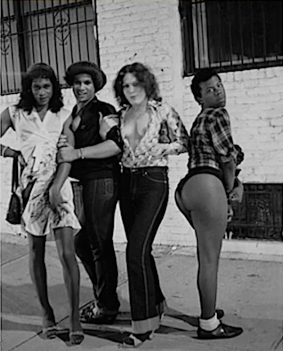 The Stroll also pays tribute to important activists such as Sylvia Rivera and Marsha P. Johnson. The Stroll also pays tribute to important activists such as Sylvia Rivera and Marsha P. Johnson. When one of the girls who worked on 14th Street, Amanda Milan, was murdered, trans activist legend Sylvia Rivera (who, with Marsha P. Johnson, founded STAR – Street Transvestite Action Revolutionaries) helped lead the community to band together to demand their rights. Building bridges across generations of trans sex workers, a civil rights movement was born. The documentary voices the marginalization, disrespect, and indifference from the gay community as well, especially when detailing the murder of trans sex worker Amanda Milan in 2000.
The Stroll also pays tribute to important activists such as Sylvia Rivera and Marsha P. Johnson. The Stroll also pays tribute to important activists such as Sylvia Rivera and Marsha P. Johnson. When one of the girls who worked on 14th Street, Amanda Milan, was murdered, trans activist legend Sylvia Rivera (who, with Marsha P. Johnson, founded STAR – Street Transvestite Action Revolutionaries) helped lead the community to band together to demand their rights. Building bridges across generations of trans sex workers, a civil rights movement was born. The documentary voices the marginalization, disrespect, and indifference from the gay community as well, especially when detailing the murder of trans sex worker Amanda Milan in 2000.
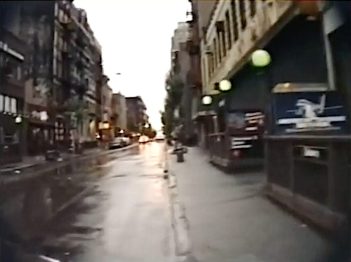 As Lovell talks to Egyptt, Cashmere, Ceyenne, Carey, Lady P, Tabytha, and siblings Stephanie and Elizabeth, she draws a portrait of a time and place that is both long gone and still haunting present in memory. She and Drucker, aided by archival producer Olivia Streisand fill out the picture with vivid footage that brings us back to the late 20th century and rekindled my own memories of the Meatpacking District from my own time in New York back in the 80s and early 90s.
As Lovell talks to Egyptt, Cashmere, Ceyenne, Carey, Lady P, Tabytha, and siblings Stephanie and Elizabeth, she draws a portrait of a time and place that is both long gone and still haunting present in memory. She and Drucker, aided by archival producer Olivia Streisand fill out the picture with vivid footage that brings us back to the late 20th century and rekindled my own memories of the Meatpacking District from my own time in New York back in the 80s and early 90s.
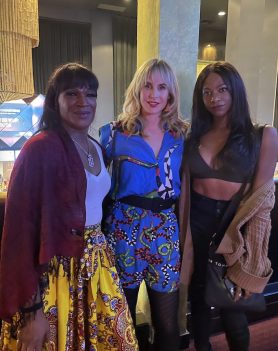 The film ends on a promising note: the culture has changed and evolved, with more nonprofit support available – especially for youth transition. Kristen Lovell proves a highly compelling narrator and on-camera presence. This Lovell’s second time as a time producer and happened to be is Drucker’s feature directing debut, following the premiere of her HBO limited series “The Lady and the Dale.” She also worked as a producer on the Golden Globe and Emmy Award-winning series “Transparent,” and shared an Emmy nomination with the producers of “This Is Me.” After the screening, Outfest Fusion provided a lively Q&A with co-directors Kristen Lovell and Zachary Drucker and many of key members of the team who made this film possible.
The film ends on a promising note: the culture has changed and evolved, with more nonprofit support available – especially for youth transition. Kristen Lovell proves a highly compelling narrator and on-camera presence. This Lovell’s second time as a time producer and happened to be is Drucker’s feature directing debut, following the premiere of her HBO limited series “The Lady and the Dale.” She also worked as a producer on the Golden Globe and Emmy Award-winning series “Transparent,” and shared an Emmy nomination with the producers of “This Is Me.” After the screening, Outfest Fusion provided a lively Q&A with co-directors Kristen Lovell and Zachary Drucker and many of key members of the team who made this film possible.